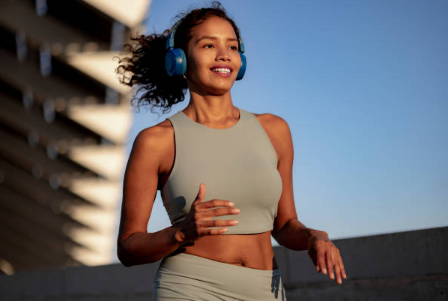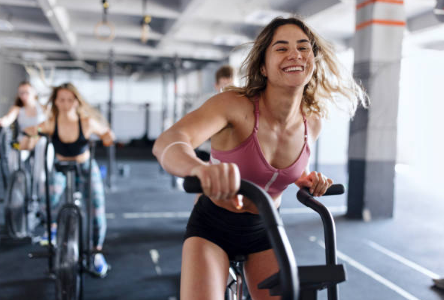The power of regular fitness is impressive. Moderate physical activity can improve your mental, physical, and emotional well-being. Specifically, some of the benefits of regular exercise include:
- Build stronger muscles
- Feel more confident
- Helps prevent chronic health problems
- Maintain a healthy weight
- Lift your spirits

Of course, you can’t change your chronological age. But exercise can improve your health and make you look and feel younger than your actual age.
Here are the 15 physical and mental effects of regular sweating on the brain and body.
Exercise Slows down Cell Senescence
Exercise doesn’t just make you feel younger. Regular physical activity may reduce the aging process of the chromosomes.
Telomeres are the caps at the ends of chromosomes that control aging, and telomeres become shorter with age. Longer telomeres are associated with longevity. Some studies have found a link between regular exercise and telomere lengthening, suggesting that exercise can slow down your body clock.
While exercising doesn’t guarantee you longevity, it can greatly improve your odds of longevity.
Exercise Gives You More Energy
Exercise is like nature’s energy drink that stimulates your brain and body to make you feel more alert and energized.
Exercise puts your body in a state of euphoria, which translates into more vitality and a greater sense of well-being. Daily tasks become less strenuous and require less effort.
The steps you take may make you feel like you’ve lost a year or two of your brilliance.
Exercise Leaves Your Skin Soft and Radiant
The sweat dripping from your forehead gives your cheeks a dewy glow, which can be one of the many ways fitness keeps your skin youthful.
In a 2019 study published in the journal Biology (Basel), researchers looked at a small group of adults aged 20-84. People over the age of 40 who exercise regularly have skin similar to those in their 20s and 30s who have softer, more elastic skin.
Researchers speculate that exercise produces body substances that help slow down skin aging. However, researchers say more research is needed to understand how exercise changes skin composition.
Exercise Can Improve Your Posture
Due to muscle loss and changes in bone density, your posture may be affected as you age.
Counteract this effect with strength training to enhance muscle and bone health. Strength training that targets your core and spine can help you stand taller and make you look much younger.
Exercise also makes you feel mentally strong, so you’ll naturally stop hunching over and straighten up.
Exercise Can Improve Your Flexibility
Aging can make your muscles and joints stiff. But Hough points out that regular exercise, especially stretching-oriented exercises like yoga and Pilates, can keep you relaxed and flexible.
But if you enjoy cardio, you can still improve your flexibility by warming up and cooling down with foam roller exercises. Try using foam gym tools to remove knots that form in your muscles and reduce stiffness.

Exercise Can Help You Get a Good Night’s Sleep
If you’re having trouble getting restful sleep, exercise may be the key to improving your sleep habits. Studies have shown that people who exercise regularly fall asleep more easily and are more likely to experience deep REM sleep.
A heart-pounding workout can make you tired, but there’s so much more to it than that. A good night’s sleep helps your body function optimally, so you’re less likely to feel stressed and toss and turn throughout the night.
A 2017 review published in Advances in Preventive Medicine found that exercise helped improve sleep quality and duration in a large number of people, especially middle-aged and older adults and those with chronic diseases.
Exercise Keeps Your Metabolism High
As we age, our metabolism naturally slows down. But scheduling regular exercise may help you burn calories and maintain a healthy weight.
If you do resistance training at least a few times a week, you’ll burn more calories. Free weight exercises or bodyweight exercises can help build muscle mass.
The more muscle you have, the higher the calories you burn. Even if you stop exercising, it will stay at a high level throughout the day.
Exercise Reduces Belly Fat
As you age, the fat that used to fall on your buttocks and thighs will increasingly appear along your abdomen, especially if you have experienced menopause. Menopause is a natural process of aging that occurs 12 months after the last menstrual period.
Unlike fat in other parts of the body, visceral fat increases the risk of chronic diseases, such as type 2 diabetes and heart disease. Visceral fat buffers the organs in the abdominal area.
Visceral fat can be difficult to lose, but regular aerobic exercise may reduce it. A 2016 study published in the Canadian Journal of Physiology and Pharmacology found that high-intensity intermittent aerobic exercise reduced more belly fat than other types of aerobic exercise that burned the same number of calories.
Exercise Makes Your Heart More Efficient
Like all muscles, your heart becomes weak after a period of inactivity. As a result, your heart has to work harder to pump blood throughout your body. Eventually, this can increase stress and leave you feeling tired and out of breath very quickly.
But moderate-intensity exercise, such as walking briskly for 30 minutes, can boost heart function and help the heart pump oxygen-rich blood through your system more efficiently.
Exercise Can Prevent Heart Disease
Regular exercise can reduce the risk of heart problems, such as high blood pressure and triglycerides, which increase with age. Triglycerides are fats in the blood that can clog or harden arteries. Blood pressure and triglycerides are the leading causes of heart disease, which is one of the most common causes of death in the United States.

Exercise can also raise levels of high-density lipoprotein (HDL), or ‘good’ cholesterol, which protects your heart from cardiovascular disease.
Exercise Can Improve Your Blood Flow
As you age, you may notice that your joints become stiff. In addition, your blood vessels may lose their flexibility, making it difficult for them to dilate and contract as needed.
If your blood vessels lose this flexibility, they won’t be able to carry oxygen-rich blood to your brain, heart, and muscles. Stiff arteries can lead to increased blood pressure, which means your heart has to work harder to pump blood through your arteries.
Exercise can lower blood pressure and improve circulation. A 2020 study published in the Journal of Physiology found that simple stretching exercises such as yoga or Pilates also helped enhance arterial flexibility.
Exercise Can Improve Your Mood
You’ve probably heard of the “runner’s orgasm,” the blissful mood boost that can occur during any sweaty cardio workout. This feeling is down to endorphins, which are chemicals released by your body when you are active.
Endorphins are like natural opiates. Some evidence suggests that fitness sessions can trigger changes in other neurotransmitters, such as dopamine, which is associated with feelings of pleasure. These neurotransmitters can also help your brain cope better with stress. The self-confidence you gain will also make you feel happier.
Exercise Reduces Anxiety
A long run outdoors or a scenic hike can distract you from your worries and anxieties. But there may be physiological reasons why exercise can lower stress levels.
Exercise induces the release of endorphins, which have a relaxing effect and reduce anxiety. In addition, meditation exercises such as yoga or tai chi can encourage mindfulness and physical movement. Focus on the present moment, focus on your breathing and heart rate, which can make it hard for you to feel stressed because of a work project or a big presentation.
Exercise Enhances Memory
It’s a common belief that aging causes forgetfulness, but that’s not necessarily taken for granted. Some evidence suggests that negative assumptions, rather than age, can damage people’s perceptions of their own abilities. These stereotypes, in turn, can lead to memory deficits.
But other studies have found that everyone, regardless of age, can help their brains age better than average age by exercising.
For example, a 2015 study published in the British Journal of Sports Medicine found that regular aerobic exercise increased hippocampus size in a sample of women with mild cognitive impairment. The hippocampus is the part of the brain that is associated with memory.
Conclusion
Exercise can provide a range of anti-aging benefits, and looking better is just one of them. Regular exercise fights aging from the inside out.
The benefits of staying active extend to your physical, mental, and emotional health, and even your sex life. Exercising regularly can help you lose belly fat, prevent chronic diseases, and cope with stress, especially as you age.